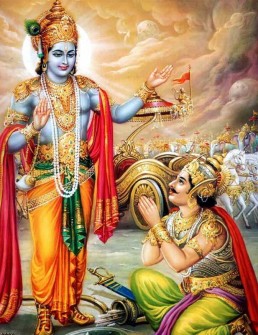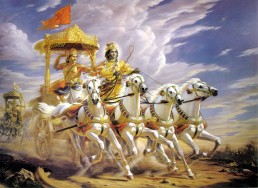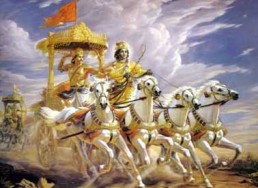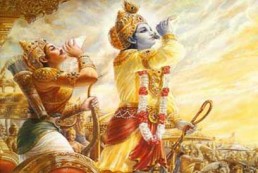Bhagavad Gita-Chapter 13 All Verses with Meaning and Audio
प्रकृतिं पुरुषं चैव क्षेत्रं क्षेत्रज्ञमेव च ।
एतद्वेदितुमिच्छामि ज्ञानं ज्ञेयं च केशव ॥ १३-१॥
prakṛtiṃ puruṣaṃ caiva kṣetraṃ kṣetrajñameva ca
etadveditumicchāmi jñānaṃ jñeyaṃ ca keśava 13-1
इदं शरीरं कौन्तेय क्षेत्रमित्यभिधीयते ।
एतद्यो वेत्ति तं प्राहुः क्षेत्रज्ञ इति तद्विदः ॥ १३-२॥
idaṃ śarīraṃ kaunteya kṣetramityabhidhīyate
etadyo vetti taṃ prāhuḥ kṣetrajña iti tadvidaḥ 13-2
क्षेत्रक्षेत्रज्ञयोर्ज्ञानं यत्तज्ज्ञानं मतं मम ॥ १३-३॥
kṣetrakṣetrajñayorjñānaṃ yattajjñānaṃ mataṃ mama 13-3
स च यो यत्प्रभावश्च तत्समासेन मे शृणु ॥ १३-४॥
sa ca yo yatprabhāvaśca tatsamāsena me śṛṇu 13-4
ब्रह्मसूत्रपदैश्चैव हेतुमद्भिर्विनिश्चितैः ॥ १३-५॥
brahmasūtrapadaiścaiva hetumadbhirviniścitaiḥ 13-5
इन्द्रियाणि दशैकं च पञ्च चेन्द्रियगोचराः ॥ १३-६॥
indriyāṇi daśaikaṃ ca pañca cendriyagocarāḥ 13-6
एतत्क्षेत्रं समासेन सविकारमुदाहृतम् ॥ १३-७॥
etatkṣetraṃ samāsena savikāramudāhṛtam 13-7
आचार्योपासनं शौचं स्थैर्यमात्मविनिग्रहः ॥ १३-८॥
ācāryopāsanaṃ śaucaṃ sthairyamātmavinigrahaḥ 13-8
जन्ममृत्युजराव्याधिदुःखदोषानुदर्शनम् ॥ १३-९॥
janmamṛtyujarāvyādhi duḥkhadoṣānudarśanam 13-9
नित्यं च समचित्तत्वमिष्टानिष्टोपपत्तिषु ॥ १३-१०॥
nityaṃ ca samacittatvamiṣṭāniṣṭopapattiṣu 13-10
विविक्तदेशसेवित्वमरतिर्जनसंसदि ॥ १३-११॥
viviktadeśasevitvam aratirjanasaṃsadi 13-11
एतज्ज्ञानमिति प्रोक्तमज्ञानं यदतोऽन्यथा ॥ १३-१२॥
etajjñānamiti proktamajñānaṃ yadato’nyathā 13-12
अनादिमत्परं ब्रह्म न सत्तन्नासदुच्यते ॥ १३-१३॥
anādimatparaṃ brahma na sattannāsaducyate 13-13
सर्वतः श्रुतिमल्लोके सर्वमावृत्य तिष्ठति ॥ १३-१४॥
sarvataḥ śrutimalloke sarvamāvṛtya tiṣṭhati 13-14
असक्तं सर्वभृच्चैव निर्गुणं गुणभोक्तृ च ॥ १३-१५॥
asaktaṃ sarvabhṛccaiva nirguṇaṃ guṇabhoktṛ ca 13-15
सूक्ष्मत्वात्तदविज्ञेयं दूरस्थं चान्तिके च तत् ॥ १३-१६॥
sūkṣmatvāttadavijñeyaṃ dūrasthaṃ cāntike ca tat 13-16
भूतभर्तृ च तज्ज्ञेयं ग्रसिष्णु प्रभविष्णु च ॥ १३-१७॥
bhūtabhartṛ ca tajjñeyaṃ grasiṣṇu prabhaviṣṇu ca 13-17
ज्ञानं ज्ञेयं ज्ञानगम्यं हृदि सर्वस्य विष्ठितम् ॥ १३-१८॥
jñānaṃ jñeyaṃ jñānagamyaṃ hṛdi sarvasya viṣṭhitam 13-18
मद्भक्त एतद्विज्ञाय मद्भावायोपपद्यते ॥ १३-१९॥
madbhakta etadvijñāya madbhāvāyopapadyate 13-19
विकारांश्च गुणांश्चैव विद्धि प्रकृतिसम्भवान् ॥ १३-२०॥
vikārāṃśca guṇāṃścaiva viddhi prakṛtisambhavān 13-20
पुरुषः सुखदुःखानां भोक्तृत्वे हेतुरुच्यते ॥ १३-२१॥
puruṣaḥ sukhaduḥkhānāṃ bhoktṛtve heturucyate 13-21
कारणं गुणसङ्गोऽस्य सदसद्योनिजन्मसु ॥ १३-२२॥
kāraṇaṃ guṇasaṅgo’sya sadasadyonijanmasu 13-22
परमात्मेति चाप्युक्तो देहेऽस्मिन्पुरुषः परः ॥ १३-२३॥
paramātmeti cāpyukto dehe’sminpuruṣaḥ paraḥ 13-23
सर्वथा वर्तमानोऽपि न स भूयोऽभिजायते ॥ १३-२४॥
sarvathā vartamāno’pi na sa bhūyo’bhijāyate 13-24
अन्ये साङ्ख्येन योगेन कर्मयोगेन चापरे ॥ १३-२५॥
anye sāṅkhyena yogena karmayogena cāpare 13-25
तेऽपि चातितरन्त्येव मृत्युं श्रुतिपरायणाः ॥ १३-२६॥
te’pi cātitarantyeva mṛtyuṃ śrutiparāyaṇāḥ 13-26
क्षेत्रक्षेत्रज्ञसंयोगात्तद्विद्धि भरतर्षभ ॥ १३-२७॥
kṣetrakṣetrajñasaṃyogāttadviddhi bharatarṣabha 13-27
विनश्यत्स्वविनश्यन्तं यः पश्यति स पश्यति ॥ १३-२८॥
vinaśyatsvavinaśyantaṃ yaḥ paśyati sa paśyati 13-28
न हिनस्त्यात्मनात्मानं ततो याति परां गतिम् ॥ १३-२९॥
na hinastyātmanātmānaṃ tato yāti parāṃ gatim 13-29
यः पश्यति तथात्मानमकर्तारं स पश्यति ॥ १३-३०॥
yaḥ paśyati tathātmānamakartāraṃ sa paśyati 13-30
तत एव च विस्तारं ब्रह्म सम्पद्यते तदा ॥ १३-३१॥
tata eva ca vistāraṃ brahma sampadyate tadā 13-31
शरीरस्थोऽपि कौन्तेय न करोति न लिप्यते ॥ १३-३२॥
śarīrastho’pi kaunteya na karoti na lipyate 13-32
सर्वत्रावस्थितो देहे तथात्मा नोपलिप्यते ॥ १३-३३॥
sarvatrāvasthito dehe tathātmā nopalipyate 13-33
क्षेत्रं क्षेत्री तथा कृत्स्नं प्रकाशयति भारत ॥ १३-३४॥
kṣetraṃ kṣetrī tathā kṛtsnaṃ prakāśayati bhārata 13-34
भूतप्रकृतिमोक्षं च ये विदुर्यान्ति ते परम् ॥ १३-३५॥
ॐ तत्सदिति श्रीमद्भगवद्गीतासूपनिषत्सु
ब्रह्मविद्यायां योगशास्त्रे श्रीकृष्णार्जुनसंवादे
क्षेत्रक्षेत्रज्ञविभागयोगो नाम त्रयोदशोऽध्यायः ॥ १३॥
bhūtaprakṛtimokṣaṃ ca ye viduryānti te param 13-35
oṃ tatsaditi śrīmadbhagavadgītāsūpaniṣatsu
brahmavidyāyāṃ yogaśāstre śrīkṛṣṇārjunasaṃvāde
kṣetrakṣetrajñavibhāgayogo nāma trayodaśo’dhyāyaḥ 35

Description
Bhagavad Gita Chapter 13 Summary
Prakṛti-Puruṣa-Viveka-Yoga – The Yoga of Distinguishing Matter from Spirit
Whereas the first 6 chapters of the Gita were focused on the individual self (jiva) and the next 6 on the seemingly external Supreme Reality (Ishvara), the final 6 chapters beginning with this one show that they are actually one. The key to this oneness is the ability to disregard the transient and inert matter envelopments and understand the reality of the Self alone. To do that, one must know what constitutes matter and this chapter explains that using the concepts of “field” and “knower of the field”. Below are the main themes of Chapter 13:
Verses 1
Introduction
Verses 2 – 7
Kṣetram and kṣetrajña
Verses 8 – 12
Jñānam
Verses 13 – 19
Jñeyam
Verses 20 – 24
Puruṣa and prakṛti
Verses 25 – 35
Sādhanam and phalam
Gita Chapter 13 – Commentary by Swami Paramarthananda
Background
In the first six chapters, Lord Krishna talked about the nature of jīva (tvam-pada) and karmayoga predominantly. In the second six chapters, Bhagavān discussed the nature of Īśvara (tat-pada) and upāsanā predominantly — especially virāḍ-upāsanā. When a seeker goes through these stages of understanding and sādhanam, he becomes ready for jñānayoga which is the recognition of the identity between the jīva and Īśvara (asi-pada). This is the topic which will be dealt with in the following six chapters.
The thirteenth chapter is presented in the form of six topics — kṣetram, kṣetrajña, jñānam, jñeyam, puruṣa and prakṛti.
Though these are discussed separately, we should note that kṣetrajña, jñeyam, and puruṣa are the same essentially. Similarly, kṣetram and prakṛti are essentially the same.
Kṣetram
The entire objective universe is kṣetram. From the beginningless prakṛti (avyaktam) everything experienced by us comes under this. It includes mahat (cosmic intellect), ahaṅkāra (cosmic ego), the subtle and gross elements, sense organs of action and perception, the mind and its modifications (6, 7). Still, Krishna specially mentions the body as kṣetram (2) because we generally do not see the body as part of the universe.
Kṣetrajña
That conscious principle which illumines the kṣetram is called kṣetrajña (2). Having defined kṣetrajña, Krishna reveals that the kṣetrajña is none other than the Lord (i.e. Brahman) Himself who is the consciousness in all bodies (3). Thus, kṣetrajña is one all-pervading consciousness. (This kṣetrajña alone is called jīva. So, the idea given here is the essential identity of jīva and Īśvara.)
Jñānam
From the 8th to the 12th verse, Krishna talks about some important val-ues which prepare the mind for Self-knowledge. They are: humility, simplicity, non-violence, forbearance, honesty, service to the teacher, purity, steadfastness, self-control, detachment from sense objects, absence of egoism, constant awareness of the misery in birth, death, etc., dispassion, non-identification with son, wife, house, etc., being always equanimous in desirable and undesirable situations, unswerving devotion to the Lord, seclusion, non-indulgence in people’s company, constant self-enquiry, and not losing sight of the fruit of Self-knowledge.
Jñeyam
In the next six verses (13th to 18th), Krishna talks about the Truth which is to be known. It is beginningless, beyond sat and asat (13), all-pervading, subtle, far (for the ignorant), and near (for the wise) (16). Though undivided, it appears divided and it is the creator, sustainer, and destroyer of all (17). It is the light of consciousness which resides in the heart of all (18). Being subtle, it cannot be known in its pure form. Yet, it shines in the body (as Awareness-Existence) and in the world (as Existence). One has to recognize it as pure Awareness-Existence by distinguishing it from the body and the world (14, 15). (This method of teaching is called adhyāropa-apavāda-prakriyā i.e. the method of superimposition and negation.)
Having talked about these four topics, Krishna glorifies this knowledge as the one which leads the seeker to Him (19).
Puruṣa and Prakṛti
Now comes the last pair, puruṣa and prakṛti (20 to 24). Both are beginningless. Blessed by puruṣa, prakṛti creates everything (20 and 27). (Though beginningless, puruṣa and prakṛti are of opposite nature. While puruṣa is conscious, changeless and real, prakṛti is inert, changing, and unreal.) The body, the mind, and their activities belong to prakṛti, whereas puruṣa is a mere illuminator of all these (21). When puruṣa obtains in the body as kṣetrajña, it seems to be a kartā, bhoktā, etc. But as paramātmā, the absolute, it is ever unaffected and is ever the same (23). Not knowing this, when puruṣa (i.e. kṣetrajña) identifies with the body and its guṇas, then, all limitations and the consequent problems arise (22). One who has the discriminative knowledge of puruṣa and prakṛti attains immortality (24).
In the following verses (25th and 35th) Krishna sums up the teaching and presents its sādhanam and phalam. The wise man is one who always abides in the Self, which is the same everywhere (28 and 29), which is actionless (30), and which is unaffected (32) like the space or like the light (34). The Self is not only the illuminator of everything (34) but also the substratum of the whole universe (31). In fact, there is no universe other than the Self (35). One who has assimilated this wisdom is Brahman itself (31) and attains the supreme goal of liberation (35).
To gain this knowledge, one has to purify the mind through karma-yoga, gain knowledge through enquiry (sāṅkhya-yoga), and ultimately get established in the knowledge through dhyānayoga (25 and 26).
Gita 12th Chapter – Main Points
Introduction: 1
Kṣetram and kṣetrajña: 2 to 7
Jñānam: 8 to 12
Jñeyam: 13 to 19
Puruṣa and prakṛti: 20 to 24
Sādhanam and phalam: 25 to 35
Since the main topic is the discrimination between the kṣetram and kṣetrajña, this chapter is called Kṣetrakṣetrajña vibhāga yoga.
Other Bhagavad Gita Shlokams
Bhagavad Gita
The Bhagavad Gita, or the Song of the Lord, is a dialogue between Krishna, an incarnation of Vishnu, and his friend and disciple, Arjuna. Composed of 701 Shlokas arranged in 18 chapters, the Gita is one of the best-known philosophical texts of…
Bhagavad Gita-Chapter 01 All Verses with Meaning and Audio
Bhagavad Gita Chapter 1 All Verses for easy chanting along with Audio and Meaning. Lyrics In English, Sanskrit, Hindi, Telugu, Tamil, Gujarati, Bengali and many more languages.
Bhagavad Gita-Chapter 02 All Verses with Meaning and Audio
Bhagavad Gita Chapter 2 All Verses for easy chanting along with Audio and Meaning. Lyrics In English, Sanskrit, Hindi, Telugu, Tamil, Gujarati, Bengali and many more languages.
Bhagavad Gita-Chapter 03 All Verses with Meaning and Audio
Bhagavad Gita Chapter 3 All Verses for easy chanting along with Audio and Meaning. Lyrics In English, Sanskrit, Hindi, Telugu, Tamil, Gujarati, Bengali and many more languages.
Bhagavad Gita-Chapter 04 All Verses with Meaning and Audio
Bhagavad Gita Chapter 4 All Verses for easy chanting along with Audio and Meaning. Lyrics In English, Sanskrit, Hindi, Telugu, Tamil, Gujarati, Bengali and many more languages.
Bhagavad Gita-Chapter 05 All Verses with Meaning and Audio
Bhagavad Gita Chapter 5 All Verses for easy chanting along with Audio and Meaning. Lyrics In English, Sanskrit, Hindi, Telugu, Tamil, Gujarati, Bengali and many more languages.
Bhagavad Gita-Chapter 06 All Verses with Meaning and Audio
Bhagavad Gita Chapter 6 All Verses for easy chanting along with Audio and Meaning. Lyrics In English, Sanskrit, Hindi, Telugu, Tamil, Gujarati, Bengali and many more languages.
Bhagavad Gita-Chapter 07 All Verses with Meaning and Audio
Bhagavad Gita Chapter 7 All Verses for easy chanting along with Audio and Meaning. Lyrics In English, Sanskrit, Hindi, Telugu, Tamil, Gujarati, Bengali and many more languages.
Bhagavad Gita-Chapter 08 All Verses with Meaning and Audio
Bhagavad Gita Chapter 8 All Verses for easy chanting along with Audio and Meaning. Lyrics In English, Sanskrit, Hindi, Telugu, Tamil, Gujarati, Bengali and many more languages.
Bhagavad Gita-Chapter 09 All Verses with Meaning and Audio
Bhagavad Gita Chapter 9 All Verses for easy chanting along with Audio and Meaning. Lyrics In English, Sanskrit, Hindi, Telugu, Tamil, Gujarati, Bengali and many more languages.
Bhagavad Gita-Chapter 10 All Verses with Meaning and Audio
Bhagavad Gita Chapter 10 All Verses for easy chanting along with Audio and Meaning. Lyrics In English, Sanskrit, Hindi, Telugu, Tamil, Gujarati, Bengali and many more languages.
Bhagavad Gita-Chapter 11 All Verses with Meaning and Audio
Bhagavad Gita Chapter 11 All Verses for easy chanting along with Audio and Meaning. Lyrics In English, Sanskrit, Hindi, Telugu, Tamil, Gujarati, Bengali and many more languages.
Bhagavad Gita-Chapter 12 All Verses with Meaning and Audio
Bhagavad Gita Chapter 12 All Verses for easy chanting along with Audio and Meaning. Lyrics In English, Sanskrit, Hindi, Telugu, Tamil, Gujarati, Bengali and many more languages.
Bhagavad Gita-Chapter 14 All Verses with Meaning and Audio
Bhagavad Gita Chapter 14 All Verses for easy chanting along with Audio and Meaning. Lyrics In English, Sanskrit, Hindi, Telugu, Tamil, Gujarati, Bengali and many more languages.
Bhagavad Gita-Chapter 15 All Verses with Meaning and Audio
Bhagavad Gita Chapter 15 All Verses for easy chanting along with Audio and Meaning. Lyrics In English, Sanskrit, Hindi, Telugu, Tamil, Gujarati, Bengali and many more languages.
Bhagavad Gita-Chapter 16 All Verses with Meaning and Audio
Bhagavad Gita Chapter 16 All Verses for easy chanting along with Audio and Meaning. Lyrics In English, Sanskrit, Hindi, Telugu, Tamil, Gujarati, Bengali and many more languages.
Bhagavad Gita-Chapter 17 All Verses with Meaning and Audio
Bhagavad Gita Chapter 17 All Verses for easy chanting along with Audio and Meaning. Lyrics In English, Sanskrit, Hindi, Telugu, Tamil, Gujarati, Bengali and many more languages.
Bhagavad Gita-Chapter 18 All Verses with Meaning and Audio
Bhagavad Gita Chapter 18 All Verses for easy chanting along with Audio and Meaning. Lyrics In English, Sanskrit, Hindi, Telugu, Tamil, Gujarati, Bengali and many more languages.
Gita Dhyanam
The Gītā Dhyānam, also called the Gītā Dhyāna or the Dhyāna Ślokas associated with the Gītā, is a 9-verse Sanskrit poem that has often been attached to the Bhagavad Gita, one of the most important scr
Bhagavad Gita-Chapter 13 All Verses with Meaning and Audio – Bhagavad Gita – Bhagavad Gita Chapter 13 All Verses Easy Chanting with Audio and Meaning, Lyrics



